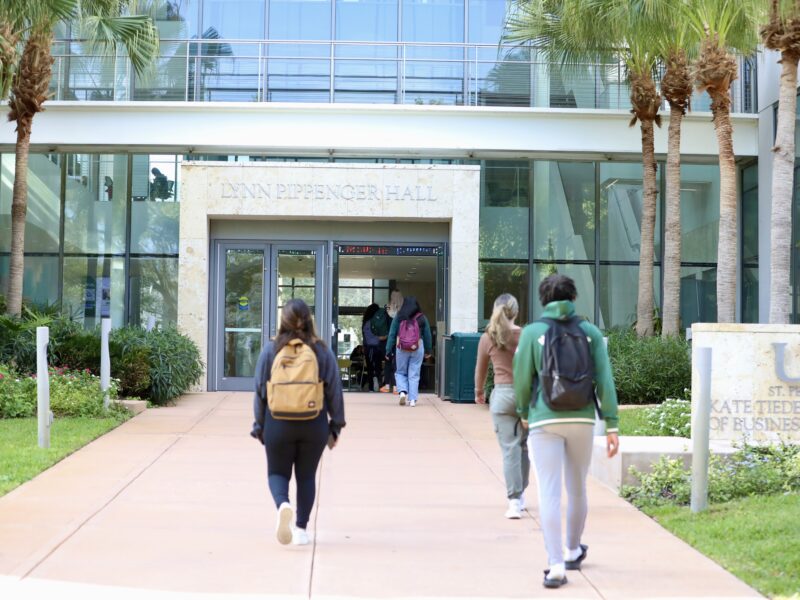As people pass him on the sidewalk, James Scott, SG senator, nods and says a quick but clear hello. He asks how they are doing and tells them to have a good day.
He’s a little more relaxed than he sometimes appears when he’s on campus, speaking at a General Assembly Senate meeting or leading the SG Judiciary & Ethics Committee. No longer content to hide the fact that he is gay—as he has been doing all his life—the environmental science & policy major decided it was time to be open about who he is.
Oct. 11 is National Coming Out Day, founded in 1988 by psychologist Robert Eichberg and Jean O’Leary, an openly gay political leader. The Human Rights Campaign now leads the day of awareness, which aims to spread messages of equality.
Scott was motivated to tell his story because he thinks it could serve as inspiration to other students in his shoes, to show that they are not alone. He aspires to a public life of politics, and thought that if he is going to be open about who he is, he should start now.
Scott has been involved in campus leadership since 2008, serving in the SG senate, working as an RA, and participating in work-study. His story as a student leader has been about his failures as much as his successes—underage drinking cost him both his RA position and his first successful bid for SG president. But he learned from those mistakes, kept his goals in focus, and was elected SG president again for the 2010-2011 academic year.
He felt guilty, he said, for keeping mum about being gay while serving as president last year. He began by telling coworkers at his job at a Tampa Bay area restaurant, and then started telling some of his closer friends from school, but has not yet told his family.
“If you’re a leader, you have a responsibility to set an example,” he said. He hopes his story strikes a chord with others in the same boat, and encourages them to stop feeling as though they need to hide.
The laws in the U.S. are far from perfect, he said. “How happy, how free of a life I live is directly tied to laws governing marriage, adoption, parental rights, taxes,” Scott said. “I don’t want to be a crusader for gay rights, I want to be a crusader for all things justice related.”
He wants to fight against a lot of things, he said—the death of the middle class, the exploitation of the poor. But he wonders how much other people who aren’t accepting, who aren’t tolerant, will allow him to be part of the debate.
“Some people really believe there is something perverse or sinister about gay people,” he said, adding that in politics, all sides should be able to disagree while respecting each other. “How can you truly make peace with someone if they think your existence is an abomination?”
Scott thinks he will be labeled as the “gay politician” and be pigeonholed into being an advocate for gay rights. He wants to fight the injustices that reduce the LGBT community to second tier status—rigid marriage laws, laws preventing gay couples from adopting children—but sees it as just one of the problems that need solving.
“There are so many issues of justice in our time … There is a whole list of things that need to be fought for. This is only one of them,” he said. He doesn’t want society to put him in a neatly labeled box. “I just want to be me, to go out and fight for a lot of things, and stand up for a lot of things.”
Scott says he has been inspired by some recent events—the end of the military’s “Don’t ask, don’t tell,” President Barack Obama’s refusal to continue to defend the anti-gay marriage Defense of Marriage Act in court, The It Gets Better campaign’s fight against bullying. Over 130,000 gay and lesbian couples marked themselves as “married” on the latest U.S. Census.
But while perhaps the nation is becoming more accepting of its gay citizens, and people’s differences in general, society still has a long way to go. The key is education, Scott said, to create a world in which children don’t feel bad about who they are.
Scott knew he was different, as a boy growing up in a conservative town, going to a conservative church. He hoped he could be like everybody else, that maybe being gay was something he could grow out of.
“It’s not OK that our kids grow up in a world where they have to feel like there is something fundamentally wrong with them,” he said. “It makes kids feel like they’re not a part of the world they grow up in.”
The world should be challenging, he said—it should make you work, and strive—but it should not be alienating. He’s felt lonely, and felt forced to hide and be introverted—but it’s also given him confidence. He will graduate in May, and of all he’s learned on campus, coming to terms with who he is has taught him to have faith in himself.
“I can’t help what I come from. I can’t help who I am,” he said. “But I can control what I stand for.”
Photo by Keeley Sheehan



